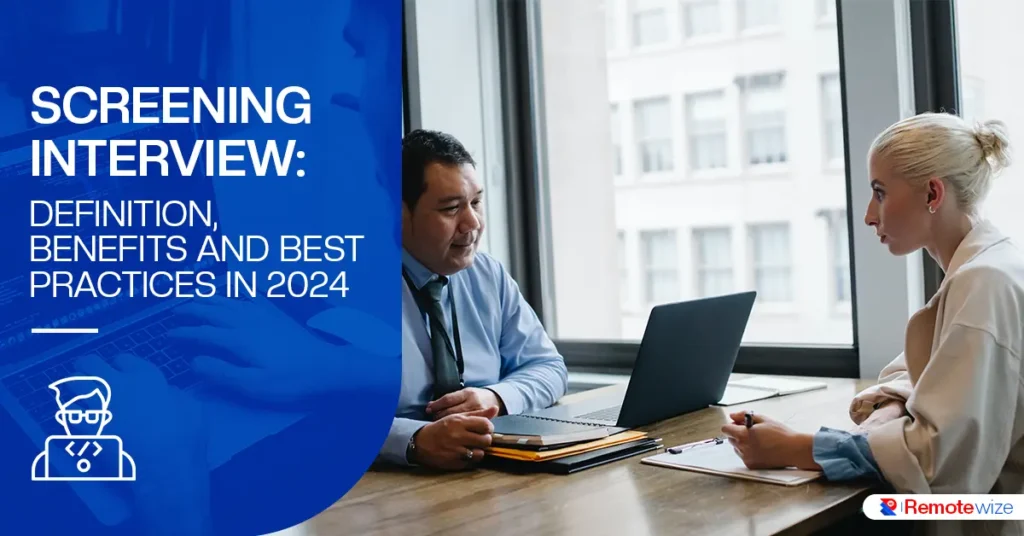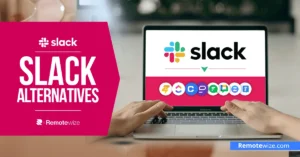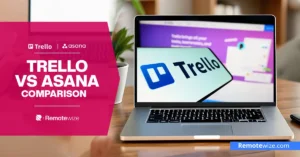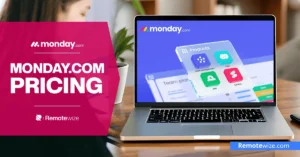As Mary Krull — Lead Talent Attraction Partner at Southern New Hampshire University — opines, hiring remotely opens up the talent pool. More often than not, every job ad generates an overwhelming number of applicants. The question becomes, how do we whittle down the pool and proceed with high-potential candidates? Enters a screening interview.
Screening interviews enable you to separate the wheat from the chuff. They let you see through the buzzwords in the resumes and junk curriculum vitae (CVs) to weed out applicants who are bluffing. If you’re hiring remotely for the first time and don’t know how to conduct screening interviews, we’ve got you covered here.
In this guide, we’ll discuss everything you need to know about screen interviews. We picked the brains of renowned HR experts, and we’ll share their opinions throughout the article. Stick by as we discuss a screening interview, its purpose, best practices, and the best screening interview platforms.
What Is a Screening Interview?
A screening interview is the preliminary interview you administer to screen or filter job applicants. It’s the first and critical step in remote hiring that enables companies to narrow down their talent pool to retain those they think are best fit for the open position.
What Are The Most Common Types of Screening Interviews?
The most common types of screening interview are phone, video and questionnaire screening interviews. Let’s get into details:
1. Phone Screening Interview
A phone screening interview involves contacting potential talent through the phone. Generally, phone screening interviews are short and don’t require an investment in any interviewing platforms. For this reason, they are an excellent option for brands seeking to minimize hiring costs.
One notable drawback of phone screening interviews is that you can’t see non-verbal cues during the interview.
2. Video Screening Interview
Unlike the simple phone interview, a video screening interview allows you to assess the candidate’s body language. There are two ways of conducting a video screening interview.
One, you can request the candidate to record a video answering specific screening questions. Alternatively, you can conduct a live video screening interview through online screening apps.
Some of the best platforms for video screening interviews include Zoho Recruit, Zoom, Google Meet, and VidCruiter, among others.
3. Questionnaire Screening Interview
If the role in your organization requires an in-depth assessment of the candidate’s situational judgment, a questionnaire screening interview is a good option. Questionnaires involve screening interview questions, determining whether a candidate has specific skills required for a role.
How To Conduct A Screening Interview
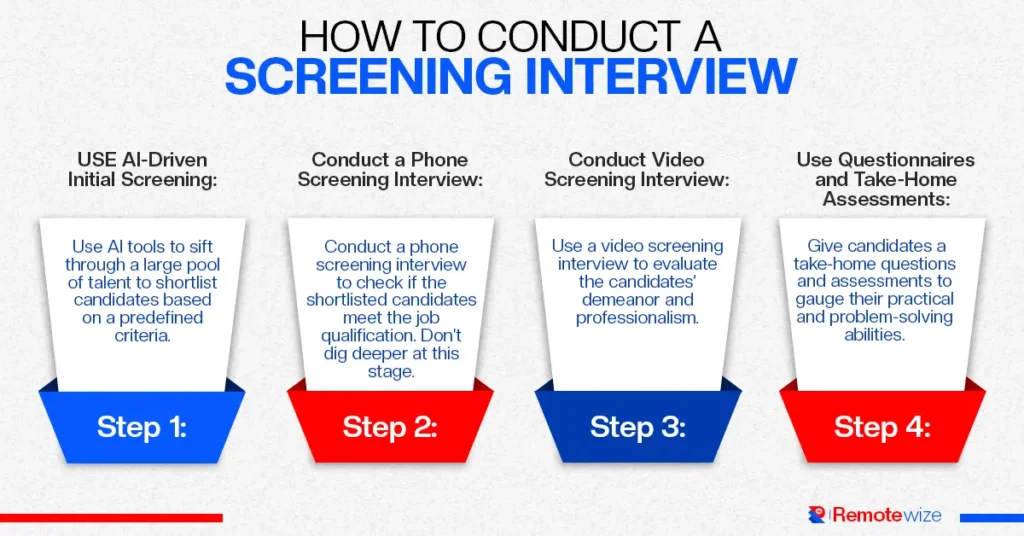
While you can choose a video or phone screening interview, we recommend taking a multi-faceted approach. An approach that blends the three screening methods enables you implement a more holistic evaluation. This allows you to pinpoint top talents while promoting diversity, inclusivity, and fairness in your hiring process.
Here is how to conduct a multi-faceted screening Interview:
1. Use AI-Driven Initial Screening
The advent of AI tools is a blessing and curse in equal measures for HR professionals. The proliferation of AI tools has made it possible for candidates to quickly put together applications that match the job description. As a result, you probably have to deal with a litany of junk CVs and applications.
Luckily, the same AI tools can help you sift out unhonest applications, before you even schedule a phone interview. Using AI tools for initial screening helps sift through a large pool to shortlist candidates based on specific criteria.
2. Conduct a Phone Interview
Start with a phone interview without video to mitigate biases and promote objective assessment. Jessica adds that the phone lets you evaluate each candidate based solely on their qualification and responses. Some of the things to check during a phone screening interview include:
- Communication skills
- Role fit
- Ability to articulate skills and experiences
- Overall suitability
3. Introduce Video Screening Interview
During the phone screening interview you spotted the right fit early and are certain those that sailed through have the potential to be your hire. However, these candidates aren’t yet ready for the main interview.
The video screening interview helps evaluate the candidates professionalism and demeanor. These are important factors for assessing the candidates cultural fit within a virtual team. Seeing the candidate on video also helps provide valuable insights into the candidate’s non-verbal cues.
4. Use Questionnaires and Take-Home Assessments
Lastly, give successful candidates take-home assessments to delve deeper into their preferences, experiences and cultural alignment. Questionnaires and assessments enable you to gauge the candidates practical skills and problem solving abilities.
Just bear in mind there’s no one-fits-all strategy when it comes to screening interviews. What works best for you is a strategy that can ensure the candidates that sail through to the main part of the hiring process have the requisite skills and resonate with the unique ethos of your organization.
What Is The Purpose of Screening Interview?
A screening interview isn’t a formality: it’s a critical step in the hiring process. Get it right and you’ll find the best talent for the role. But if you get it wrong, it won’t be long before you schedule another hiring round — wasting time and money. Here’s why you need to conduct a screening interview:
Streamline the Hiring Process
Screening interviews enables you to filter our applicants who may not be the right fit for your company. It helps you whittle down the applicants’ list to retain candidates who not only meet the requirements but also align with your company culture and values.
Besides saving time and money, screening interviews sets the stage for more structured and in-depth conversation in subsequent phases of your hiring process. Ultimately, a well-structured screening interview ensures you hire only the best talents.
Lower the Cost-Per-Hire
Hiring the wrong talent for a remote position can be costly. According to the Society for Human Resource Management, the cost of making a single hire is $4700. Depending on the seniority of the role, your company can spend up to four times the position’s salary to hire.
Conducting a good screening interview can help you get the right hire, sparing you the ache of wasting hiring resources.
Give Candidates an Insight About Your Organization
The recruitment process is not solely about you finding the best fit for a role. It is also about the candidate finding their best fit. During the screening interview the candidate gets accustomed to the company culture and mission.
Why is it essential for the candidate to get familiar with the organization? It is simple: working with an employee who owns the brand is better than one with the ideal skills but feels out of place. If you are looking for talent to grow with your brand, it’s crucial for them to feel they belong in the organization.
Common Screening Interview Questions
While screening interviews should be brief, the interview questions should help you comprehensively assess the candidates. You can choose to tailor the questions to your company. Below are some common interview questions:
- What are some of your previous achievements that align with this role?
- What drew you to our organization?
- What are your organizational culture expectations?
- Do you have a salary expectation? State the specific range.
- How do you plan to capitalize on this role to improve your skills?
- How do you handle conflicts at work?
- Does this position align with your long-term goals?
- Describe what you know about this company
- Why are you interested in a remote role?
- Describe your best quality that aligns with this job
- What are your expectations about this role?
- What are your passions and hobbies?
- What sets you apart as the idea talent for this job?
- Are you currently engaged in other interviews with other organizations?
- Which leadership style do you find most effective?
- How do you handle tight deadlines?
Best Video Screening Interview Platforms
1. Google Meet
Pros
- Free to use
- Intuitive and easy to use
- Easy meeting scheduling
- Visual effects and background options
- Features encrypted data
Cons
- No meeting recording feature
Google Meets enables flawless screening interviews through its high-quality video. It supports real-time interviews, enabling you to read the candidate’s non-verbal cues. Also, the high-quality audio allows uninterrupted interactions during the screening interview.
If you have set up some problem-solving challenges for candidates, you can use the screen-sharing feature on Google Meets. It also has a recording feature that can allow you to further assess the performance of candidates after the screening interview. Note that the recording feature is not included in the free plan.
Transcribed File After Screening Interview
Google Meets has an automated transcription feature, which automatically converts the screening interview into a written file. The transcription feature spares you the time for note-taking or the extra cost of transcribing the screening interview.
Google Meets has a free plan that effectively works well for small meetings. However the free plan only covers up to 24 hours for one-on-one calls. If you are trying to save on costs, you can use the free plan and upgrade later, depending on your needs.
2. Willo
Pros
- Pre-recorded questions
- Incredible support team
- Candidates can answer questions at their own pace
Cons
- No real-time interaction with candidates
Willo is the perfect tool for convenience. It ensures that the candidate and the recruiter have the screening interview without tampering with the regular schedule. Candidates can answer the screening interview questions at their own pace and convenience.
Recruiters can acquire talent from anywhere around the globe without struggling with timezone differences. Willo is tech-friendly and has excellent automated features. For example, the tool can automatically share screening interview links on any platform.
Get a Background Check For Candidates
Hiring remote talent can be stressful because of scammers and frauds. Willo eases such stress through the unique background-checking feature. You can receive a report verifying the candidate is who they say they are, hence avoiding hiring impersonators.
Willo has affordable plans starting from $68/month. The tool offers a 15-day free trial with no strings attached.
3. Zoom
Pros
- Screening interview on Facebook
- Easy to use
- Perfect for large meetings
Cons
- Inability to control unwelcomed comments
Zoom provides an easy-to-use platform that makes screening interviews convenient for both the recruiter and the candidate. It offers high-quality video and audio that minimizes interruptions during the interview session.
Zoom has virtual background features that allow you to create the right environment for a screening interview from any site. It also features top-notch security to secure the screening interview and enhance privacy.
Divide a Large Pool of Candidates Into Smaller Groups
Zoom has a unique feature called breakout rooms. Breakout rooms are incredible for recruiters who want to conduct screening interviews for many candidates. With breakout rooms, you can divide the larger talent pool into smaller groups and regroup them after the screening questions.
You can access breakout rooms within the Zoom free plans. If your business is expanding, affordable monthly packages start from $12.49.
4. VidRecruiter
Pros
- User-friendly interface
- Excellent support team
- Customisable video integration
Cons
- Overwhelming availability of features
VidRecruiter is an incredible tool to assist remote brands in streamlining their hiring process. It helps you navigate hiring talent through its live interview and pre-recorded features if you have recently transitioned to a remote work arrangement.
Another incredible VidRecruiter feature is the ability to filter a large talent pool. The tool has reliable automated features that can narrow down candidates to those that match the role. You can also conduct panel interviews when needed during the technical interview process.
You Don’t Need To Send Out Invites Manually
VidRecruiter can schedule screening interviews. It’s essential to save time during the hiring process, and VidRecruiter can help you by setting everything up before the interview. Automatic scheduling also eases things for the candidate.
VidRecruiter does not offer a free plan. However, depending on your needs, it has a free trial and customised quotes.
5. Zoho Recruit
Pros
- Feature ATS and CRM
- Great price for small businesses
- Features inbound marketing tools
Cons
- Customisation limitations
Zoho Recruit is an efficient tool to help you find potential talent for any position. It is a great tool that guides recruiters through the initial job posting process. Zoho Recruit walks with the recruiter and helps them track the best candidates.
Whether you are looking for a temporary freelancer or a permanent remote talent, Zoho Recruit is a one-stop recruiting tool. The tool has advanced analytics to help you track potential talent from job applications to screening interviews, all through the hiring process.
Leverage on Technology During Hiring
Zoho Recruit maximises technology and advanced analytics to keep the screening of candidates optimised. It features data-driven mechanisms to help recruiters optimise screening interviews and technical interviews.
Zoho Recruit has an incredible free plan. The free program has numerous features that recruiters can leverage.
Virtual Screening Interview Best Practices
Below are some of the virtual screening interview best practices for brands to get the best talent for remote positions:
- Ensure a flawless technical set-up before the interview
- Have basic information about the candidates
- Have a group of pre-screening interview questions put together
- Facilitate an engaging conversation
- Allow the candidate appropriate time to respond
- Ensure there is clarity in communication during the screening process
Final Thoughts
A screening interview is a critical part of hiring for a new skill. This step helps you save time and cut costs during the hiring process. Remote companies can utilize phone screening interviews, video screening, or questionnaires. Screening interview strategies gives recruiters an upper hand by filtering talent, leaving the best fit to be processed to the next phase at a small cost.
Zoom, VideoRecruiter, Google Meet, and Zoho Recruit are the best tools to administer screening interview questions. Recruiters should maintain best practices for virtual screening interviews to achieve success.
FAQs: Screening Interview
What Is the Meaning of Screening Interview?
A screening interview is an initial part of the hiring process where the recruiter determines a candidate’s suitability through a short assessment.
How Long Is a Screening Interview?
Screening interview questions typically take a minimum of 15 minutes to a maximum of 30 minutes, depending on the recruiter.
Which App Is Best for Video Interview?
VidCruiter is an incredible tool for video interviews. It has excellent features, including automatically setting up virtual screening interviews.

